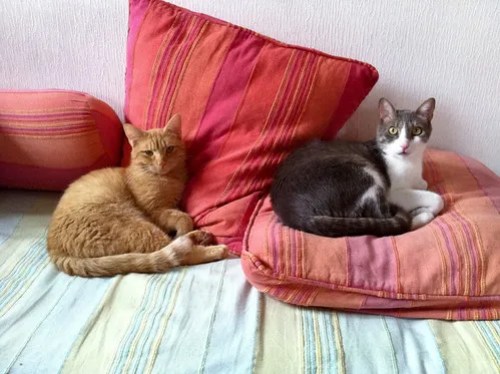[fr] Une semaine avec mes super-pouvoirs qui me permettent d'entendre aussi bien qu'un chat 🙂
Last Friday, I stepped into a small shop in the mall near the motorway exit. I walked out with two magic amulets. The moment I started wearing them, I started hearing sounds like I had never heard them before.
I have a superpower: I can listen in on conversations I am not taking part in; I can hear the noise the cat litter makes as it trickles back into the box when I scoop things out; I hear my cat lapping water in the next room, and people moving in the other flats; birds sing so loud and clear they seem to be perched on my shoulder; the rustle of a paper bag or my clothes fills the whole room; I have the ears of a dog.
Best of all, instead of having to reach out to grasp the sounds of speech when I’m talking with somebody, the sound comes to me, crystal clear — right into my ears. I am no longer trying to catch others’ words. They find me, even when I’m not expecting to be talked to, even when I’m not looking at the one producing the words.
OK, I lied a bit — the amulets are not magical, they’re technological. They look like this:
(I am thinking of swapping metal grey for pink, though — that part isn’t visible, of course, but I like the idea.)
Those of you who know me well enough know that I do not hear well. I never had. My hearing is particularly deficient in the frequencies used by speech. (I’ll post my audiogram here later, it’s at eclau and I don’t want to walk down the whole two floors to get it ;-)) After a disastrous attempt at getting me hearing aids when I was fourteen (I wore them all of two days) I’ve finally decided to give it another go — and so far, I’m delighted.
I’m actually starting to realize how deaf I am. Or how badly I hear. (Pick your expression of choice.) The audiologist initially programmed the hearing aids to their optimal setting, based on my audiogram. I was shocked. When he spoke to me just after the setting process, I instinctively looked for the microphone he was speaking into. He wasn’t speaking into a microphone.
Imagine you arrive early at the stage, and the band playing the gig is rehearsing with being plugged in. And suddenly somebody plugs in the mikes and the amps. That’s what it felt like. “You have got to be kidding,” I told him. “It’s way too loud.” He told me he was going to run another test to confirm, and as he turned back to the keyboard his pen escaped his hands. You know the sound a pan makes when you drop it on the kitchen floor? Well, that’s pretty much how much noise his pen made.
After running the second test, he confirmed that the settings were right. I was hearing sounds the way somebody with normal hearing hears them. So loud! Way too loud! This is of course a common reaction, and the audiologist always decreases the settings to something more tolerable so the new wearer of hearing aids can get used to them. Usually, he decreases them by 4dB — in my case, by 8dB. And he also reduced amplification of weak sounds to cut out as much background noise as possible.
Given my strong initial reaction to the “optimal” setting and the traumatic teenage failure behind me, we weren’t taking any chances.
One thing I was really worried about was the physical discomfort of having something in my ear. My memory of my first attempt at wearing hearing aids is that they were hugely uncomfortable (of course technology has evolved in 25 years, but still!). I also know I cannot stand the completely occlusive inside-the-ear earbuds — I bought a pair once, listened to music 30 minutes with it, and had to bring it back. It hurt too much.
My audiologist recommended dabbing the part that goes inside the ear with sweet almond oil. It works wonders. The first day I had to remove my hearing aids a couple of times because my ears were tickling. After 2-3 days, no more, though I was happy to remove them at the end of the day. Now, I almost forget about them. I’m actually almost worried that at some point I’ll stop noticing them so much I’ll hop into the bath or the shower without removing them… oopsie.
Even with a setting 8dB below what I should have, it makes a stunning difference to me when I’m talking with people. I actually understand every word. I don’t need to guess anymore. I might even stop watching movies with subtitles, who knows! I keep hearing sounds that I don’t know how to identify yet, so I’ll often end up looking all around me in the bus or street to try to figure out what it is I’m hearing. A friend commented that what I’m going through is probably a bit similar to what happens to babies when they realize that sound is stuff they’re hearing. It’s not all pleasant, of course (loud drunk teenagers in public transport are even louder), but overall I am already at a point where I do not want to not wear them. I’m hooked.
What amazes me, though, is to think that this is still way below how you (well, most of you reading this) hear. I’d love to be able to edit a recording based on my audiogram to make it sound to “normal hearing people” the way it would sound to me. And I’m looking forward to getting sufficiently used to my current settings that we can turn the volume up even a bit more!
















